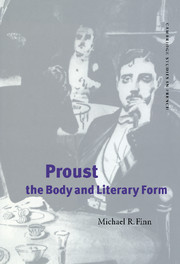3 - Transitive writing
Published online by Cambridge University Press: 05 November 2009
Summary
In spite of his carefully cultivated image as a literary hermit, Marcel Proust was always very much attuned to his social and cultural environment. He wrote frequently about the literary activities of his contemporaries – René de Chantal's Marcel Proust, critique littéraire is a monument to his life-long critical activity – and from time to time about societal issues close to his heart. Proust was a social chronicler and journalist, a productive essayist and critic, an inexhaustible (if perpetually exhausted) correspondent, a translator, and a master of the pastiche, before he became the novelist we know today.
Yet, as we shall see, writing to others and about others was, in Proust's view, a malady which required a cure. I have chosen the term ‘transitive writing’ to describe this Other-orientated part of Proust's production, because it suggests writing with an external object in mind, and a stance of attention and response to an external phenomenon. (Jean-Louis Baudry uses ‘intransitive writing’ to describe an activity which refers back only to the writing subject.) For Proust, writing about the Other means being filled with the presence of the Other, having the Other predominantly on one's mind as one writes, becoming a sympathetic resonating chamber for the Other's ideas, and I shall include even correspondence under this rubric, for reasons explained later in this chapter. Many critics concur that the quasi-intransitive feel of the beginning of A la recherche du temps perdu is one of Proust's great innovations.
- Type
- Chapter
- Information
- Proust, the Body and Literary Form , pp. 102 - 141Publisher: Cambridge University PressPrint publication year: 1999

